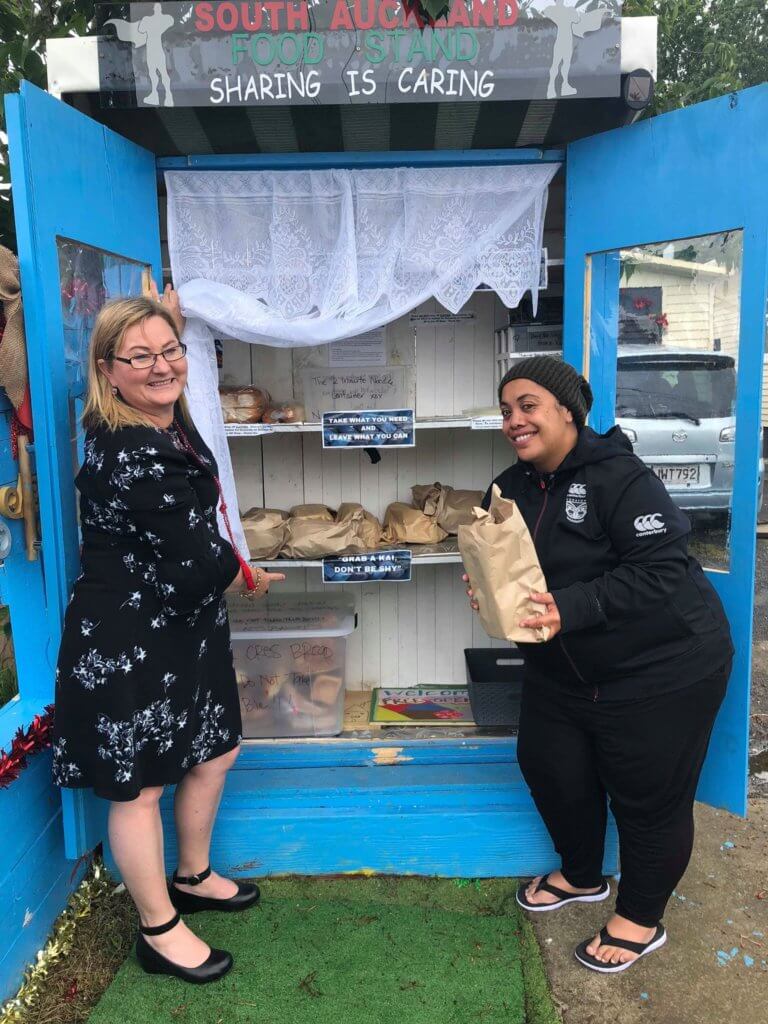Pātaka Kai: Free pantries feeding neighbourhoods around New Zealand

One couple’s vision to support their community has seen an entire network of Pātaka Kai stands created around New Zealand.
Swanie Nelson, and her husband Terry, are the instigators of the Pātaka Kai Open Street Pantry movement which has popped up in the last six months.
Pātaka Kai, which means storehouse or pantry in te reo Māori, is a place where people can leave food for other people to take for free.
It was a move to Otara in South Auckland seven years ago that set the Nelsons on this path. Having spent almost 20 years working in community development at a national level, they decided to “commit ourselves to doing stuff on our backdoor step.”
They took the time to get to know their neighbours and their community. This is when it became apparent to Swanie that a big problem in her community was access to food, which meant children were going to school hungry. Their focus became how to help the community get access to food in an easy, non-invasive way.
Swanie knew about the ‘little free pantries’ initiative in the USA where small wooden pantries were put up outside of people’s houses where food could be donated and taken by the community. Because food sharing is already a part of Māori and Pasifika culture, she thought that the model of the Pātaka Kai would work well in South Auckland, but with bigger pantries than the American model.
They built a pantry and put it up outside their house and got another member of the community, who lived nearby, to also put one up. Swanie felt that there needed to be at least two pantries to start a movement. It wasn’t long before there were 10 pantries in Otara alone.
The ethos surrounding the pantries is “take what you need, leave what you can” and they are managed by local residents, known as the Kaitiaki or guardians. They foster a sense of community whereby people can help support their neighbours.
Swanie says that the key to the Pātaka Kai success is that there is no judgement involved. Anyone can take or leave food without being seen by other members of the community, so it removes any sense of shame or embarrassment from the situation.
Reducing food waste at the same time
An unexpected side effect of the Pātaka Kai project has been an increased awareness of food waste.
The pantries provide a centralised space for people to share excess fruit and vegetables from their gardens, like oranges from the Nelson’s neighbour’s tree that were never harvested before and were just left to fall on the ground and rot.
“Prior to this it wasn’t like I was a food waste champion,” said Swanie. “I had never really stopped to consider implications of food waste in that capacity, until this movement.”
Creating the Pātaka Kai has given a way for the community to learn about food waste in an informal and natural way, which Swanie believes has resonated with the community more. Through the process of Pātaka Kai the community have been able to physically see the amount of food that goes to waste, by donating useable, unwanted food for the benefit of others that would have otherwise gone to landfill.
Since the Nelson’s launched their first Pātaka Kai outside their house earlier this year, there are now 96 pantries around New Zealand and another 120 under construction.
This success is bittersweet for Swanie because although it is creating access to food, a stronger sense of community and reducing food waste, it has highlighted just how many people are struggling to access food.
Click here see if there is a stand near you and click here to learn how you can set up a Pātaka Kai stand in your neighbourhood.
Article by Bethany Whiteland